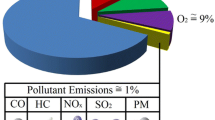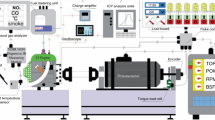Abstract
To improve the energy utilization efficiency of internal combustion (IC) engine, exergy analysis was conducted on a passenger car gasoline engine. According to the thermodynamic theory of IC engine, in-cylinder exergy balance model was built. The working processes of gasoline engine were simulated by using the GT-power. In this way, the required parameters were calculated and then gasoline engine exergy balance was obtained by programming on computer. On this basis, the influences of various parameters on exergy balance were analyzed. Results show that, the proportions of various forms of exergy in gasoline engine from high to low are irreversible loss, effective work, exhaust gas exergy and heat transfer exergy. Effective exergy proportion fluctuates with cylinder volumetric efficiency at full load, while it always increases with break mean effective pressure (BMEP) at part load. Exhaust gas exergy proportion is more sensitive to speed, and it increases with speed increasing except at the highest speed. The lower proportion of heat transfer exergy appears at high speed and high load. Irreversible loss is mainly influenced by load. At part load, higher BMEP results in lower proportion of irreversible loss; at full load, the proportion of irreversible loss changes little except at the highest speed.
Similar content being viewed by others
References
TANG Kai-yuan, OUYANG guang-yao. Higher internal combustion engine [M]. Beijing: National Defence Industry Press, 2008. (in Chinese)
FU Jian-qin, LIU Jing-ping, FENG Ren-hua, YANG Yan-ping, WANG Lin-jun, WANG Yong. Energy and exergy analysis on gasoline engine based on mapping characteristics experiment [J]. Applied Energy, 2013, 102(2): 622–630.
TAYMAZ I. An experimental study of energy balance in low heat rejection diesel engine [J]. Energy, 2006, 31(2): 364–371.
YANG Xiu-qi. Exergy analysis on the working process of diesel engine [D]. Kunming: Kunming University of Science and Technology, 2004. (in Chinese)
RAKOPOULOS C D, GIAKOUMIS E G. Simulation and exergy analysis of transient diesel-engine operation [J]. Energy, 1997, 22(9): 875–885.
WANG Jian-ning. Energy balance analysis and exergy analysis on the thermodynamic cycle of a medium speed engine [D]. Wuhan: Wuhan University of Technology, 2010. (in Chinese)
RAKOPOULOS C D, GIAKOUMIS E G. Second-law analyses applied to internal combustion engines operation [J]. Progress in Energy and Combustion, 2006, 32(1): 2–47.
NIEMINEN J, DINCER I. Comparative exergy analyses of gasoline and hydrogen fuelled ICEs [J]. International Journal of Hydrogen Energy, 2010, 35(10): 5124–5132.
AZOUMAH Y, BLIN J, DAHO T. Exergy efficiency applied for the performance optimization of a direct injection compression ignition (CI) engine using biofuels [J]. Renewable Energy, 2009, 34(6): 1494–1500.
LIU Jing-ping, FU Jian-qin, REN Cheng-qin, ZHU Guo-hui, DENG Bang-lin, KESHAV V. Experimental comparision of heat and exergy balance in a turbocharged direct-injected gasoline engine [J]. Transaction of CSICE, 2013, 31(1): 65–71. (in Chinese)
YAO Shou-guang. Thermodynamic system analysis on ship [M]. Beijing: Science Press, 2003. (in Chinese)
LIU J P, BINGHAM J F. A study on the intake pressure wave actions and volumetric efficiency-speed characteristics of multi-cylinder engines [J]. Transactions of CSICE, 1997, 15(2): 138–150.
HE Mao-gang, ZHANG Xin-xin, ZENG Ke, GAO Ke. A combined thermodynamic cycle used for waste heat recovery of internal combustion engine [J]. Energy, 2011, 36(12): 6821–6829.
FU Jian-qin, LIU Jing-ping, YANG Yan-ping, REN Cheng-qin, ZHU Guo-hui. A new exhaust energy recovery method for improving IC engine performance: Steam turbocharging [J]. Applied Thermal Engineering, 2013, 52(1): 150–159.
LIU J P, FU J Q, REN C Q, WANG L J, XU Z Z, DENG B L. Comparison and analysis of engine exhaust gas energy recovery potential through various bottom cycles [J]. Applied Thermal Engineering, 2013, 50(1): 1219–1234.
FU Jian-qin, LIU Jing-ping, REN Cheng-qin, WANG Lin-jun, DENG Bang-lin, XU Zheng-xin. An open steam power cycle used for IC engine exhaust gas energy recovery [J]. Energy, 2012, 44(1): 544–554.
Author information
Authors and Affiliations
Corresponding author
Additional information
Foundation item: Project(2011CB707201) supported by the National Basic Research Program of China; Project(10JJ5058) supported by the Natural Science Foundation of Hunan Province, China
Rights and permissions
About this article
Cite this article
Liu, Jp., Fu, Jq., Feng, Rh. et al. Effects of working parameters on gasoline engine exergy balance. J. Cent. South Univ. 20, 1938–1946 (2013). https://doi.org/10.1007/s11771-013-1693-6
Received:
Accepted:
Published:
Issue Date:
DOI: https://doi.org/10.1007/s11771-013-1693-6




